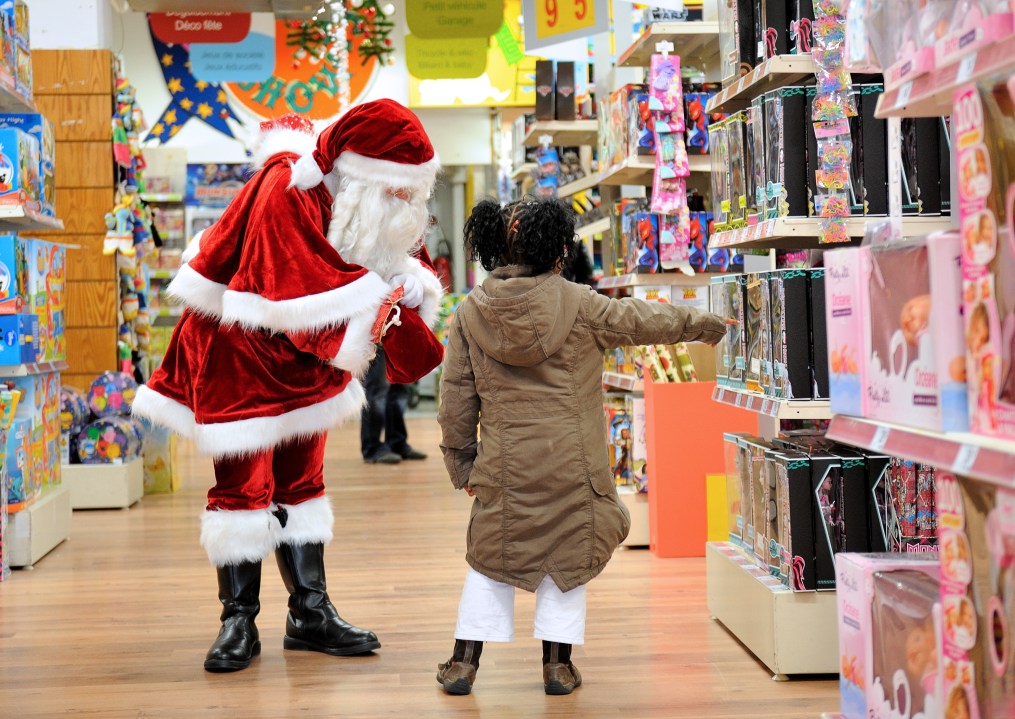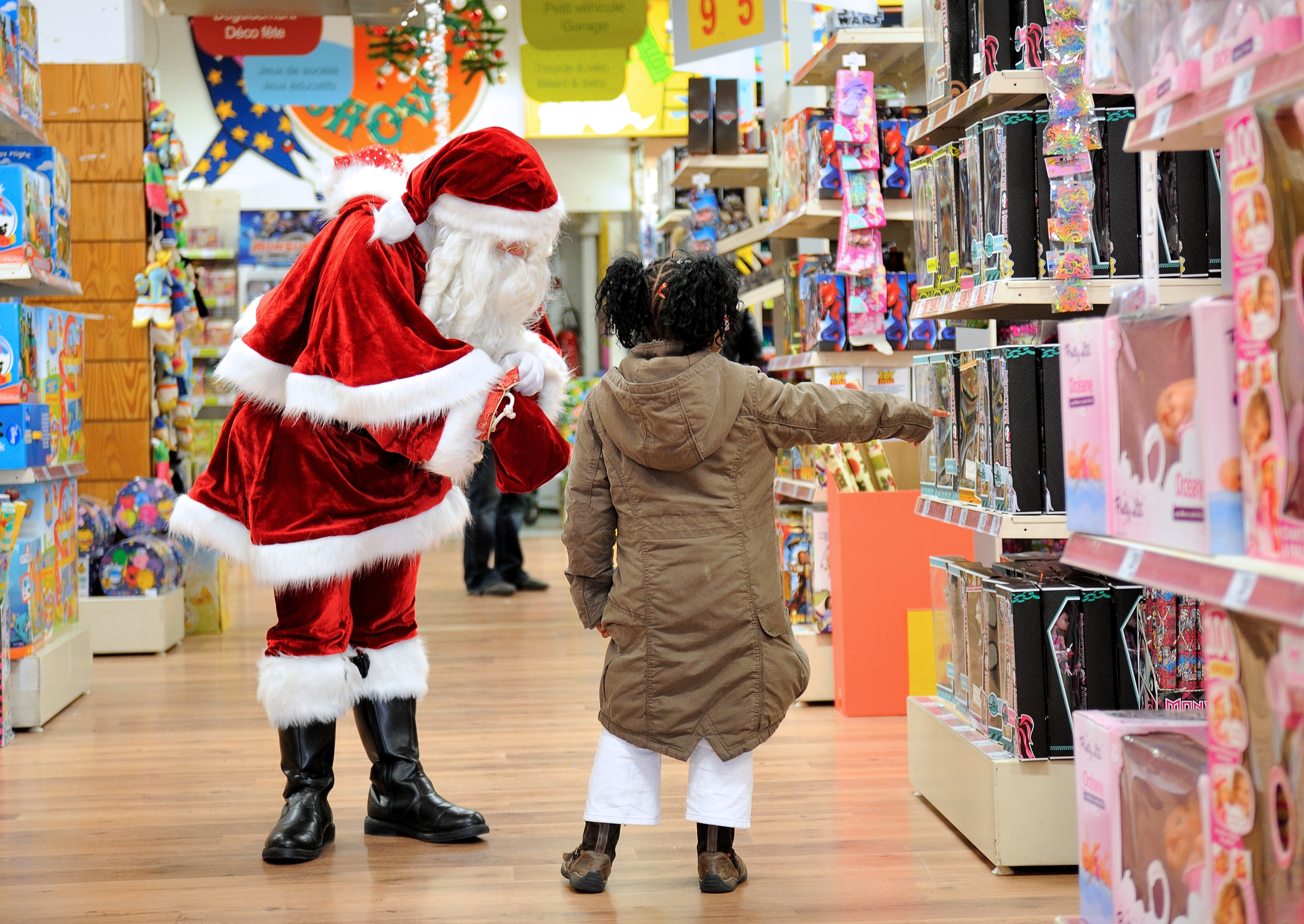I was in Toys R Us in Brent Cross the other day with my kids, pondering the true miracle of Christmas — that thanks to capitalism, global poverty has halved in just a generation, and we are now able to feed, clothe and shelter record numbers of people — and buy them lots of presents.
[datawrapper chart=”http://static.spectator.co.uk/7PcxR/index.html”]
My two-year-old was screaming because he wanted some toy cars, just a handful of fun things among an awesome display of toys that are far better, and cheaper, than they were when I was a child — and available to more people, not just in Britain but across the world.
Some of my happiest memories as a child revolve around Christmas and rampant consumerism; sure, they concern things I probably didn’t need and which, to a spiritual, mature person are meaningless. But this festival is for children, and that’s why I never really get the whole anti-Christmas thing, of which we’ve seen a few examples in the last 24 hours include.
The two most common gripes about Christmas are that it’s consumerist and that it should be about the birth of Christ; some Christians make both complaints while their successor faith, the secular Left, focuses on the former.
Unlike in many parts of the world, where the celebration of Christmas is prohibited, British Christians are free to celebrate Christ’s birth.
I went to a Christmas service on Monday and no one from the National Secular Society threatened to chop my head off. But for many people December 25 is not necessarily about the same thing as it is for believers, for Christmas has never been an entirely Christian festival. Like much of European culture it’s a fusion of Abrahamic religion and native, pagan custom; long before St Augustine came along our ancestors celebrated Yul, feasting on slaughtered animals and drinking themselves senseless. Our northerly climate requires something like it, because otherwise life would become intolerable.
The main difference between Yul and Christmas is that the latter is about children, and the celebration of one in particular. Since the industrial revolution and the growth of capitalism has allowed for the invention of childhood, by bringing down child mortality levels and creating a consumer market, Christmas has become essentially a celebration of children. The whole thing was re-invented by the Victorians, or more specifically Prince Albert, who introduced German customs such as Christmas trees; these were the same Victorians who basically invented the idea of sentimentalism in popular culture. (Schmaltzy John Lewis adverts would have had the Victorians in tears.)
I found Christmas fairly miserable from about the age of 12-29. Realising I could drink for free, without parental censure, around age 16 was something of a breakthrough, but otherwise the whole thing was fairly uninspiring. But it all changed when I became a father aged 30, and I wonder to what extent one’s view on whether the whole thing is an awful commercialised a waste of time is correlated with whether one has children.
As for the ‘commercialisation’ of Christmas, Kristian Niemietz of the capitalist running dog think-tank the IEA recently summed it up in an article, ‘Tis the Season to be Sneering‘: when people talk about consumerism they mean other peoples’ consumerism.
He wrote:
The tradition that we have added to the bundle in recent years is the collective moaning about the commercialisation of Christmas. It starts every year, reliably, around late November, and then stays with us throughout the festive season. This anti-consumerist Christmas carol goes like this: Once upon a time, Christmas was a time of solemnity, quiet enjoyment and reflection. But, at some point, it has been taken over by the corrupting forces of materialism. Today, Christmas has been reduced to a vulgar, mindless orgy of binge-shopping, devoid of any spiritual meaning. Mass consumerism has robbed Christmas of its soul and authenticity, a vacuum that people try to fill, vainly, by buying more and more stuff.
Moaning about the shallowness of Western consumer culture is, of course, itself part and parcel of Western culture. But anti-consumerist pre-Christmas moaning is more widespread and more focused. In one survey conducted in Germany (under the achingly zeitgeisty title ‘Sustainable Christmas’), 73 per cent of respondents said they were not keen on the ‘consumerist terror of Christmas’. In a similar survey in Hamburg, 54 per cent agreed that Christmas was ‘consumerist terror’, and that it was ‘all just about commerce’.
Take a survey by the Hardwood Group, in which Americans were asked about their own values, and about what they believe to be the values of American society in general. On the one hand, 95 per cent of respondents believed that most Americans are materialistic (with a majority picking the option ‘very materialistic’). Eighty-two per cent also agreed that most Americans buy and consume far more than they ‘need’.
But when people are asked about their own values and aspirations, non-material ones consistently outranked material ones by large margins. Almost no one thinks that material aspirations are important to them, but almost everyone thinks that they are hugely important to almost every one else. Obviously, these assessments cannot both simultaneously be right. We cannot all be Tibetan monks surrounded by consumerist sheeple. But we can all cultivate that self-image, sneering at the sheeple as we buy our Christmas presents, without realising that they are sneering back at us, believing themselves to be the Tibetan monks and us to be the sheeple.
My eldest has just reached the age of reason and over the next year will become far more aware of the world and its horrors — climate change, Isis, you name it. In the meantime the children are revelling in the magic of Fr. Christmas, asking increasingly unanswerable questions about Santa’s operation, and how he delivers the presents to all the children. Yet it’s a miracle that the global economic system is able to deliver so many amazing toys to so many children every year; we’re nowhere doing as well as we could, and far too many kids are in poverty, but things are far better than they have ever been.
Personally I love the consumerism of Christmas, simply because it makes children happy — and if people want to make a buck by making kids happy on Jesus’s birthday, then that’s hardly the worst thing that’s ever been done in the name of religion.








Comments